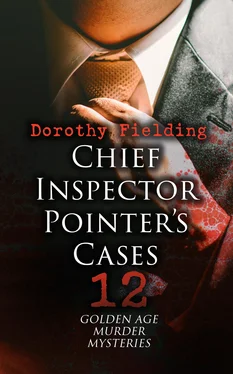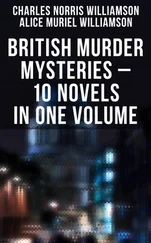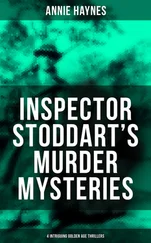"But he might have come."
"Here? To Riverview? I should like to see him dare to show his face here. I should have had him kicked out inside of ten seconds, and as for Mrs. Tangye—! I suppose you know something of his record?"
Pointer only confessed to an extreme interest to learn it.
"He was sent down from Oxford. Cheating at cards. He's been auctioneer's clerk, sailor, orchid-hunter, and rumrunner since then."
"You feel quite certain that he had not written to Mrs. Tangye in all these years? She was his only relative." Tangye sat, apparently thinking back.
"'Pon my word! I wonder if he could have had the collossal nerve! She used to say that he could blarney a cannibal. You know that he once got Branscombe to give him some money for a fresh start? Oliver started all right—drug-smuggling to the Bantus. Mrs. Tangye stopped the supplies as soon as she learnt of it."
"Was there anything odd about his appearance? I mean anything that would attract attention? Stick in the memory? Been easily recognised again?"
"Yes to all the list. Unforgettable sort of face. Bird of prey, yet clever! Then he was immensely tall and thin."
"Had he a limp?"
"He hadn't when I saw him, but if the rumour's true I heard some years back that he was gun-running for the Riffs, I should think it probable that he has one by now."
Pointer got as detailed an account of the missing man as Tangye's remembrance could supply. He asked if Miss Saunders might join them for a moment.
She came in with her quick, silent step, which yet conveyed no suggestion of lightness.
Pointer watched her in the mirror, his back to the door, as she entered. She flashed a swift glance first at him and then at Tangye. That glance was unmistakable to the eyes on her. It was a confederate's glance.
"Anything wrong?" was telegraphed as clearly as though ticked out in Morse. So these two were partners, at least for the time being. At any rate in something. Tangye's eyes avoided hers.
Turning, Pointer explained the circumstances of the missing money to her. He noticed that Tangye waited for him to do this. She looked startled and uneasy, and something else that even Pointer could not decipher, it was so quickly repressed. Pointer thought that she seemed inclined to doubt the whole story until she heard of the solicitor from whose offices Mrs. Tangye had taken the money only yesterday.
She then said that Mrs. Tangye must have banked it, or used it in some way. Tangye retorted that that was what they all thought. He looked at the woman with a lowering stare.
"Do you want us to list the money under 'missing or stolen,' or only under 'stolen'?" Haviland asked returning to the room.
Tangye started a little.
"Under 'missing or stolen,'" he said after moment's thought. It was the most natural form where a doubt existed. But it was also the only form which would let Tangye stop the inquiries should he later find, or pretend to find the money. Once entered as Stolen, only an order from the Home Office could check the search being carried through to the bitter end.
Did Tangye know this?
Pointer let Haviland do the talking, while he sat apparently listening. In reality observing. He noticed again how little the stockbroker turned to him. He made Tangye uneasy in some way. What way? And he made him more uneasy now that he was talking of the missing money. Why?
And again why did Tangye try so hard to pull himself together during this talk. Each time that he was on the point of being natural, would come some evident effort.
Evident to Pointer's observant eyes, that he was anxious to make no slip. What sort of a slip? But he seemed genuinely eager that the money should be traced. Eager, and yet cautious. Who was he shielding or prepared to shield? The Chief Inspector speculated on the new turn the case had taken. Was it an honest turn? Fifteen hundred pounds in the house Tuesday afternoon. Was that connected with the death of Mrs. Tangye or was it but a coincidence? Certainly his idea of a crime was not weakened by this new piece of intelligence. There came another thought. This lost money fitted in so well with his theory of an outsider, was it possible that that was Tangye's aim? What if he too knew of the unknown's existence, was in league with him, feared lest the police had learnt of his visit, and with the guilty man's haste to cover even non-existent tracks—had invented the lost money as a pretext for the stranger's visit?
But the longer Pointer studied the man talking to the keenly interested Haviland, the more he decided that Tangye's emotion about the loss was genuine. That Tangye was trying to repress, not to force, the note on this point. He acted to the very keen, trained eye of the detective officer like a man much more concerned in the matter than he cared to show. On this came the reflection that possibly Tangye had wanted the whole £3,000 so badly that he had had a hand in his wife's death. A hand so carefully concealed that now, little by little, he could venture to direct the search towards it. Was it a case of a criminal having been "done" by his accomplice, and trying to get that accomplice caught? Tangye's frequent use of the word suggested this. So did his manner. By what he did not say, as much as by what he did. Pointer believed that for some reason he dared not be more explicit. Yet Tangye was emphatically not a man to be frightened of shadows. A stockbroker must have good nerves.
Rising, Pointer asked Miss Saunders to come into the drawing-room. He closed the door with ostentatious care. It gave a confidential suggestion.
"Miss Saunders," Pointer spoke very low, "there seems to me, quite frankly to be something rather—well—odd, about this claim of Mr. Tangye to that fifteen hundred pounds. What do you think yourself?"
"Of course it isn't lost," she spoke shortly, and with a note of anger in her thin voice. "Mrs. Tangye's invested it somewhere that they haven't found yet. That's all."
"It's very perplexing," he said a little dismally, "very perplexing, indeed. Did you make any arrangements on Monday as to where you intended to go from here?" he asked in the same breath.
She had not expected that question. She all but jumped.
"I don't understand. Going from here? Monday? It was only Mrs. Tangye's death yesterday that made me decide to go to my sister's."
"You had your trunk brought down in the morning?"
"I thought Mrs. Tangye's idea of sending some clothes to the poor an excellent one," she said sweetly. "I intended to do the same."
"I see. Now, do you mind telling me where you were last Sunday? This lost money puts the case in our hands, and we've a regular routine to work through."
"Where was I last Sunday?" She turned a watchful eye on him. "At church, part of the time."
"It's the remaining part I want to hear about," he said lightly, "you left here, at what hour?"
"In time for the eleven o'clock service. After that I stayed with a friend. And we took the children to one of the museums by way of a treat."
"Could I have the name of the friend?"
"I couldn't think of dragging her into this sad business."
"And in the evening?"
"I spent helping her. She put me up."
"And Monday?"
"We spent shopping."
"For the children too, I suppose?" he said gravely.
A light flickered in her eyes. It looked like amusement.
"You might be a family man yourself," she murmured ironically. The door opened. But why had Tangye stopped outside to listen first? He glanced in airily.
"Oh! Sorry to interrupt. I was afraid you had gone, Chief Inspector."
"No, I was saying to Miss Saunders that with such a sum in the house why of course we have to ask a number of fresh questions."
"But who would steal bank-notes?" Miss Saunders asked pertinently.
Читать дальше












